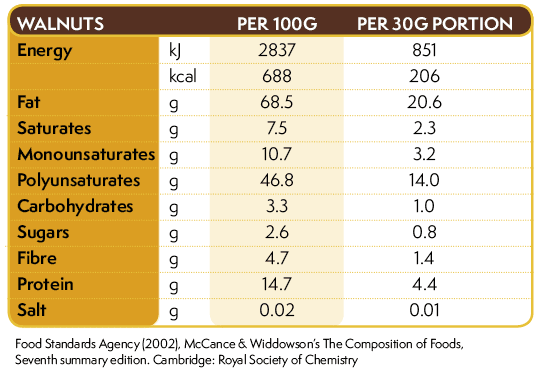 Why Walnuts
Why Walnuts
Incorporating a handful of California Walnuts into main meals throughout the day or eating them as a snack at any time, is a simple, tasty and convenient way to add important nutrients to the diet.

Nutritionally, walnuts are unique among nuts as they are primarily comprised of polyunsaturated fatty acids (PUFAs). As a result, walnuts are the only tree nut that offers an excellent source of the plant-based Omega-3 alpha-linolenic acid, ALA with 2.7g per 30g serving*. They provide 4.4g protein per 30g serving, are naturally low in sugar and salt¹ and a source of fibre2.
In addition walnuts provide a variety of micronutrients and antiooxidants. They are a good source of thiamin (vitamin B1), vitamin B6, folate, vitamin E, phosphorus, magnesium, copper, manganese and biotin and also provide a source of pantothenic acid (vitamin B5), potassium, iron and zinc3.
* A handful, 30g, is the daily recommended amount.
Walnuts and UK Dietary Guidelines
Walnuts fit well with UK dietary guidelines for healthy eating4. The Eatwell Guide5 advises on how much of what we eat should come from each food group, ultimately helping us to get a balance of healthier food. As a plant based protein, walnuts belong to the protein group of The Eatwell Guide and eating more of these is encouraged (walnuts provide 14.7g protein/100g). Choosing unsaturated fats is also encouraged, as is increasing fibre intake and limiting sugar and salt intake.
National Diet and Nutrition Survey (NDNS)6
Walnuts are a rich source of folate and a source of iron, zinc and potassium (see nutrient table above). The latest and previous UK NDNS7 showed low intakes of iron, potassium and zinc in girls aged 11-18 years, low intakes of iron in women aged 19-64 years and low intakes of potassium in all adult women. 15% of girls aged 11-18 years and 7% of women of childbearing age (19-49 years) were reported to have inadequate intakes of folate which is important in pregnancy.
Walnuts are a good source of thiamin (vitamin B1), vitamin B6, folate, vitamin E, phosphorus, magnesium, copper, manganese and biotin and also provide a source of pantothenic acid (vitamin B5), potassium, iron and zinc8.
Walnuts as part of healthy balanced diet and lifestyle can make a useful contribution to nutrient and micronutrient intakes to help maintain and benefit health.

